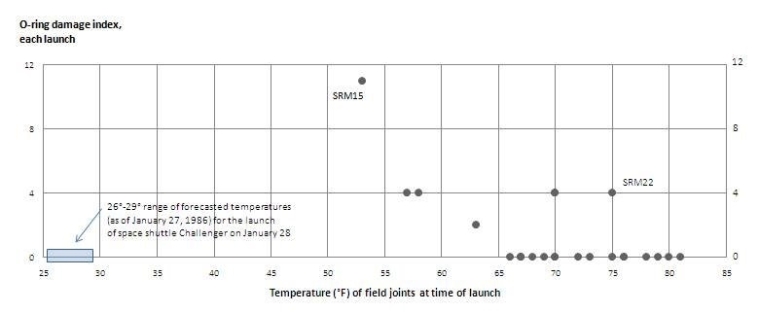From the readings, what were the root causes of the Challenger disaster? Was Roger Boisjoly ethical in sharing information with the public? Was his company justified in retaliating against him? What good is whistleblowing if “[i]t destroy[s] [your] career, [your] life, everything else”?
It seems very clear that the technical root of the Challenger disaster was an O-ring failure. But actually, the failure was that NASA managers knew that there was a high risk of such failures and did nothing to stop it. And seven people died as a result.
I am frustrated by this whole situation because something could have been done to fix it. People at NASA knew that there was a problem and chose to ignore it in order to meet budget demands and to prevent postponing this launch any longer. Which is dumb, because their lack of action led to seven families without a mother, father, wife, or husband. And there was no reason for it. It wasn’t random; it could have been prevented. But it wasn’t.
This picture shows the drastic difference in temperature at multiple launches and the amount of O-ring damage. It’s very clear that the rings are more damaged as the temperatures drop, yet obviously some people thought it would be a good idea to test the O-rings in a drastic drop of temperature (30°) and to put seven human beings in the aircraft when they did. Why does that make sense, especially when someone pointed it out to them directly? Because it was an “acceptable risk.” Ok, sure. Let’s use that term to justify this disaster—it was an acceptable risk, so they went ahead and launched a rocket they were advised not to. Good call, we should try it again some time. Or not.
I cannot blame Roger Boisjoly for sharing his information with the public because it had been made clear to NASA that there would be problems if this launch occurred. And he was shushed for speaking out the night before. His voice was heard, but by the wrong people. Why Roger Boisjoly’s name is the only one we talk about is odd to me—why don’t we use the names of the people at NASA who allowed the Challenger to launch, knowing that the temperatures were too low and could cause failure? I don’t see their names being thrown about, they being the ones who are forced to retire due to PTSD, they being the ones with their name posted all over the news. Rather, the one who took an ethical stand is the one who’s blamed.
If we look at the code of ethics, the second point is avoid harm to others. The third is Be honest and trustworthy. Boisjoly was doing both of those things by whistleblowing. He expressed his case to those it was relevant to; made sure they knew that there were very high risks associated with launching the rocket. And he wasn’t the only one to have this gut-wrenching feeling that this launch would not go well. Yet, those without enough power often can’t do anything to solve the problem:
“As problems build up without crises, a lulling, false sense of security builds up too. And at critical moments, when institutions face tough questions, experts who sit lower down on the chain of command might be reluctant to hold up the decision-making process. Meanwhile, the longer the chain of command, the easier it becomes to defray personal responsibility.” (How Challenger Exploded, and Other Mistakes Were Made)
The more these instances get looked over, the more information that needs to be passed up in the chain of command for any actions to happen prevents tangible solutions to these malfunctions. There is a negative connotation with whistleblowing, but these people are attempting to find an ethical solution to a problem. And I’m not saying that people should be tattle-tales, because everyone hates that. But if people see a problem that they know they cannot fix, that is possibly harmful to others, then their action should be welcomed and not discriminated against.